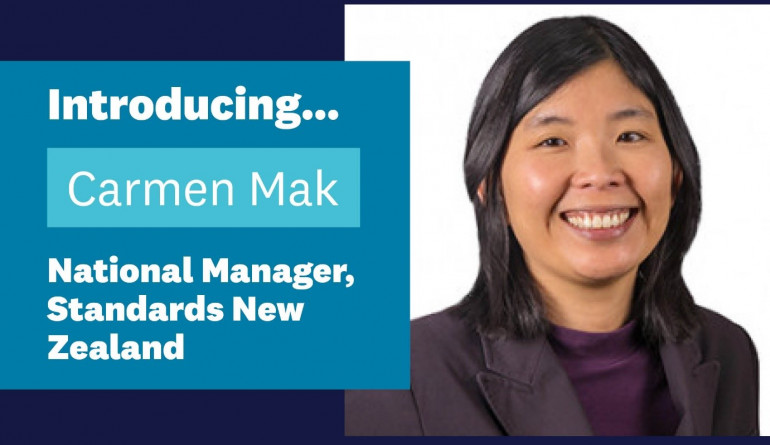National Manager Standards New Zealand Carmen Mak, shares her views on why standards matter
We catch up with Standards New Zealand National Manager Carmen Mak to recap on a busy year and remind ourselves how the work we do contributes to positive outcomes for all New Zealanders.

Carmen has helmed the Standards New Zealand team since 2016, leading the transition and integration into the Ministry of Business, Innovation and Employment Hīkina Whakatutuki (MBIE) and connecting policy writers, regulators and those on the ground who are putting standards into action.
‘This challenging year hasn’t stopped the need for standards,’ says Carmen. ‘ The world is changing in so many ways, from looking at the energy we’re likely to be using in the future to reduce our carbon emissions, to keeping exports moving and transforming how we live through digital innovation. If there are people doing business, there are standards in the background supporting that work.’
Why do standards matter?
‘When thinking about why standards matter, it’s important to ask ourselves, “So what?”
‘Nobody sees standards, not everyone gets excited by standards, and they rarely get much spotlight. So when we talk about why we should develop standards, it’s good to step back from focusing on high-level goals and look at tangible, relatable outcomes - the “so what’’.'
‘Let’s take AS/NZS 3000 Electrical installations, known as the Australian/New Zealand wiring rules. Who does this affect? Everyone. “So what?” It means electricians, both here and in Australia, have a consistent way of wiring buildings in a safe manner so that homeowners and workers can flick a switch without a second thought as to whether it’s safe to do so.'
‘That’s the value of standards. And that’s why Standards New Zealand exists as the kaitiaki – the guardian – of standards.’
Standards developed by those they impact
‘This year, NZS 8134:2021 Ngā paerewa Health and disability services standard was developed to provide much-needed consistency in health care for the aged and those with disabilities. The Ministry of Health could have simply stipulated what was required; instead, with Standards New Zealand’s independent and impartial oversight, it adopted a consensus-based approach, including public consultation, so that all perspectives could be considered.’
‘The standard was created by nurses, providers in residential care, home care and hospices, disability rights advocates, health and safety specialists, and Māori and Pasifika representatives who otherwise might not have had a seat at the table or an equal voice.’
‘Everything has been agreed by the people impacted, for the people impacted. When you look at the “so what”, you can see that the standard is a powerful tool. There’s assurance that if all these people can come together and agree, the standard has mana and authority.’
Independent process ensures robust standards
‘When standards are developed using a consensus process, with the independent Standards Approval Board approving a balanced committee of members with the right skills and experience, we ensure that all the relevant perspectives are at the table.’
‘Leading international standards developers, like the International Organization for Standardization (ISO) and the International Electrotechnical Commission (IEC), use our approach for good reason: it’s quite literally the standard process for standards development.’
Proudly supporting the bigger picture
‘With a background in policy development, I do appreciate the bigger picture of standards and how they can help contribute to the different outcomes that regulators, government and industry are seeking to achieve.’
‘I’m proud of what my small team, together with about 400 committee members who have given their time, have achieved this year, including:
- Creating guidelines for anybody – whether homeowner or business owner – to install electric vehicle (EV) chargers (would you know where to start otherwise?)
- Securing New Zealand representation on potential new international agritech standards that could shift the way we farm
- Overseeing a revision of a standard that promotes the safe use of agrichemicals, incorporating over 20 years’ worth of environmental and human health knowledge and new technology
- Updating a standard to address the difficulties that a hard-of-hearing person might encounter during a fire evacuation
- Exploring transitions to renewable and alternative energies like hydrogen.’
Future -focused with new approaches
‘Over the last five years, we have taken some deliberate approaches to transform what we do and how we do things. For example, we are making standards easier to use, with our recent innovative Digital Reader pilot giving access to highly detailed technical diagrams on mobile devices. To ensure we have a voice on the global stage, we’ll continue adopting and participating in the development of international standards. We are also working with new sectors to unlock the value that standards can provide to New Zealand as a whole.’
‘I also want to thank organisations like Energy Efficiency and Conservation Authority (EECA), Building Systems Performance (BSP) and the Ministry of Health, who partner with us or sponsor free access to relevant standards.’
‘Standards are relatable. Every day we see and use the results of their development. We’ve got more than 20 New Zealand standards in development at the moment. They’ll affect the homes we live in, the food we eat, safe transport, fire prevention, energy use and secure data use. So, while you might not see the work that goes in to their development, you’ll certainly benefit from it. I’m glad to live in a world that values standards.’
